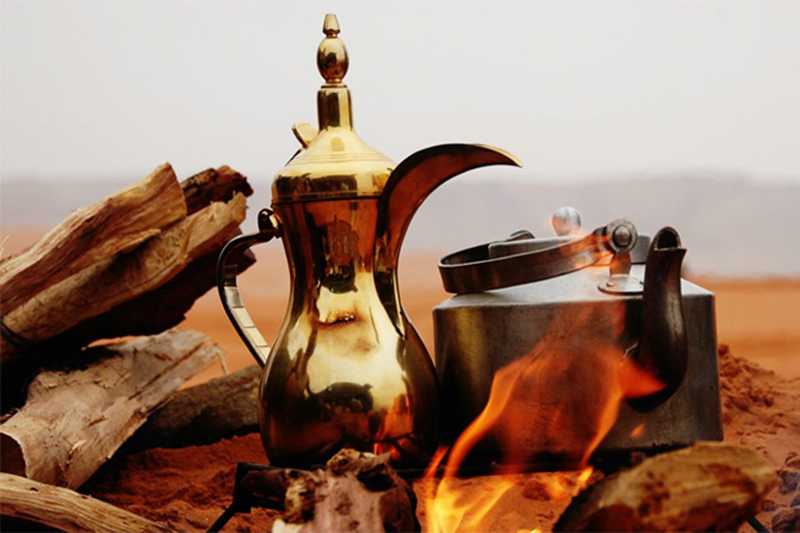Arabic Coffee And Its History
Arabic coffee is not just a drink, it's an experience steeped in history and tradition. From the arid landscapes of the Middle East, this beloved beverage has played a pivotal role in hospitality and social interaction across Arab cultures. It's more than just coffee; it's a symbol of generosity and companionship.

Origins of Arabic Coffee
The journey of Arabic coffee begins in the lush highlands of Ethiopia where coffee was first discovered. Legend has it that a goat herder named Kaldi noticed his goats becoming unusually lively after eating certain berries. Curious, he tried these berries himself and felt an unprecedented burst of energy. Monks in a nearby monastery then devised a method to brew a drink from these berries, laying the groundwork for what would become coffee.
The Cultural Significance
In Arab culture, coffee is much more than a morning stimulant; it is deeply woven into the fabric of daily life and rituals. Serving coffee to guests is seen as a sign of respect and hospitality, often accompanied by a ceremonial preparation that can last for hours, showcasing the host's dedication to their guest's comfort.
The Coffee Ceremony
The traditional Arabic coffee ceremony is a sight to behold. It begins with the roasting of green coffee beans over an open fire, filling the air with a rich, enticing aroma. The beans are then ground with a mortar and pestle, brewed in a special pot called a dallah, and served in small cups. This ritual is often performed in a majlis, a special sitting room dedicated to social gatherings.

The Journey to the Arab World
Coffee made its way from Ethiopia to Yemen, where Sufi monks used it to stay awake during their nocturnal devotions. By the 15th century, it had reached the rest of the Middle East, becoming integral to the region's social fabric.
Coffeehouses in the Middle East
The first coffeehouses, or qahveh khaneh, appeared in Mecca and quickly spread across the Islamic world. They became social hubs where people of all walks of life gathered, not just to drink coffee but to play chess, exchange news, and listen to music. This tradition laid the groundwork for the modern café culture we know today.
Opposition and Acceptance
Initially, coffee faced opposition from conservative factions within Islamic society, who feared its stimulating effects. However, it eventually gained acceptance, becoming a staple in religious, social, and business meetings.

The Brewing Methods
Arabic coffee is typically brewed using two main methods: the traditional method using a dallah, and the modern method using electronic coffee makers. Regardless of the method, the process emphasizes slow brewing to enhance flavor extraction.
Ingredients and Spices
Arabic coffee is often spiced with cardamom, saffron, and sometimes cloves or cinnamon, offering a unique flavor profile distinctly different from Western-style coffee.
Regional Variations
Each region in the Arab world has its own unique way of preparing and presenting Arabic coffee. In Saudi Arabia, coffee may be flavored with saffron, while in the UAE, it is often served with a side of dates to complement its bitterness.
Modern Popularity
Today, Arabic coffee remains a beloved beverage, enjoyed both in its traditional forms and through new adaptations. It's revered not only in the Middle East but also in specialty coffee shops around the world, celebrated for its rich history and complex flavors.
Influence on Global Coffee Culture
The traditions surrounding Arabic coffee have influenced global coffee culture profoundly, introducing the world to the art of coffee preparation and consumption as a communal and thoughtful practice.
Arabic Coffee in Popular Media
From literature to cinema, Arabic coffee has been depicted as a symbol of Arab identity and heritage, often portrayed as an integral part of Middle Eastern hospitality.
Conservation and Recognition
In 2015, the traditional art of Arabic coffee was inscribed on UNESCO’s list of intangible cultural heritage, recognizing its significant cultural and historical value and the need to preserve it for future generations.
What makes Arabic coffee different from regular coffee?
Arabic coffee differs from regular coffee primarily in its preparation, ingredients, and cultural significance. Traditionally, Arabic coffee is made with Arabica beans, which are lightly roasted and ground very finely. It's often brewed in a pot called a dallah and can be flavored with spices such as cardamom, saffron, and sometimes cloves or cinnamon, which is not common in other coffee traditions. The coffee is usually not sweetened, but it may be served with dates or other sweet dried fruits on the side. Moreover, the cultural rituals surrounding Arabic coffee, including its ceremonial preparation and serving, highlight its role as a symbol of hospitality and respect, unlike the more casual consumption of regular coffee in many other cultures.
How is Arabic coffee traditionally prepared?
Arabic coffee is traditionally prepared with a ceremonial approach. Here’s a step-by-step process:
Roasting: Coffee beans are roasted lightly, which gives Arabic coffee its distinct light color and milder flavor compared to darker roasts used in other types of coffee.
Grinding: The roasted beans are then ground into a very fine powder, traditionally using a mortar and pestle.
Boiling: The ground coffee is mixed with water and often spices like cardamom or saffron in a dallah. It is then brought to a boil, removed from the heat once boiling, and this process may be repeated several times.
Serving: The coffee is served in small cups, called finjan, without handles. Traditionally, it is poured from a height to create a light foam on top, and it is customary to serve the coffee starting with the eldest or most respected guest.
What are the health benefits of drinking Arabic coffee?
Arabic coffee, like other forms of coffee, contains several health benefits due to its antioxidants and nutrients. Here are some benefits:
Improved Mental Alertness: Arabic coffee contains caffeine, which can enhance brain function by improving mood, reaction time, memory, and mental alertness.
Antioxidants: Coffee is rich in antioxidants, which help fight free radicals and reduce oxidative stress.
Heart Health: Moderate coffee consumption has been linked to a lower risk of heart disease in some studies.
Anti-inflammatory Properties: The spices used in Arabic coffee, like cardamom and saffron, have anti-inflammatory properties that can contribute to overall health.
Can Arabic coffee be made without spices?
Yes, Arabic coffee can be made without spices, though the addition of spices like cardamom and saffron is traditional and contributes significantly to its unique flavor profile. Making Arabic coffee without spices simply involves brewing lightly roasted Arabica beans, which still delivers a distinct and enjoyable flavor.
What does the inclusion of Arabic coffee in UNESCO’s list signify?
The inclusion of Arabic coffee in UNESCO’s list of intangible cultural heritage signifies recognition of its deep cultural importance and historical roots in the Arab world. This acknowledgment helps raise awareness about the traditional practices surrounding Arabic coffee, promoting its preservation and appreciation globally. It emphasizes the beverage’s role in hospitality and social bonding in Arab cultures, underscoring the importance of safeguarding such traditions for future generations.
Direct BookingArabic coffee is more than just a beverage; it's a cultural artifact that embodies the warmth and hospitality of the Arab world. Its rich history and profound cultural significance make it a fascinating subject of both study and enjoyment.








